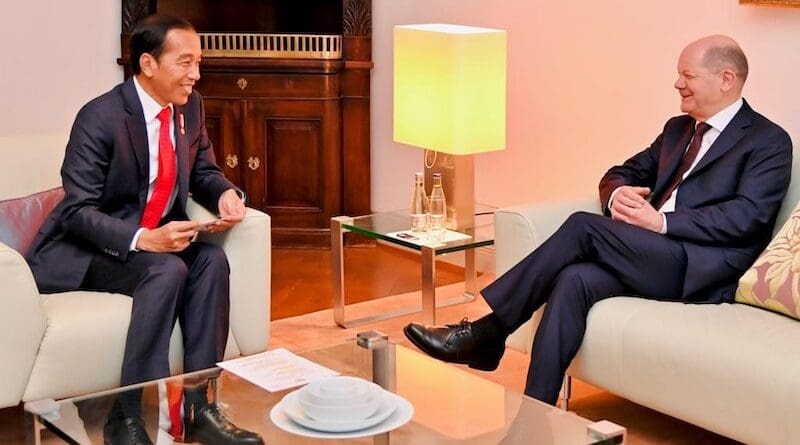Germany Walks The Talk On Southeast Asia – Analysis
By Chhengpor Aun
Germany observed its Southeast Asia Week in March 2024, hosting Malaysian Prime Minister Anwar Ibrahim, Philippine President Ferdinand Marcos Jr and Thai Prime Minister Srettha Thavisin at the Federal Chancellery in Berlin. These visits highlighted the resolve of Social Democratic Party (SPD) Chancellor Olaf Scholz’s ‘traffic light’ coalition to walk the talk on engaging Southeast Asia and to pursue a de-risking strategy towards China.
In 2020, Germany became a party to the Treaty of Amity and Cooperation in Southeast Asia as it rolled out its first ‘Policy Guidelines for the Indo-Pacific’, mapped out by then-chancellor Angela Merkel’s government. The guideline provides a roadmap for Germany to partner with ASEAN to boost trade and investment ties, fight climate change and defend the liberal international order.
Germany’s Southeast Asia overture is motivated by incumbent Chancellor Scholz’s aim to reduce dependence on China — a lesson learned from Berlin’s reliance on Russia before the invasion of Ukraine. Germany’s 2023 strategic paper on China referred to Beijing as a simultaneous ‘partner, competitor and systemic rival’.
By inviting Anwar, Marcos and Srettha to Berlin, Scholzsent a strong message to German businesses to speed up the drive towards de-risking, diversifying supply hubs and relocating plants from China by turning to Southeast Asia. Germany is also looking to Southeast Asia for supplies of critical minerals needed for the green transition, with Indonesia, the Philippines, Vietnam and Thailand on the radar as potential suppliers.
Southeast Asia is a natural partner for Germany and the European Union in times of global uncertainty as a result of geopolitical competition and geoeconomic fragmentation. If Donald Trump returns to the White House in January 2025, EU–ASEAN cooperation will be more important than ever in upholding the norms of a rules-based international order and multilateralism.
Standing alongside Marcos, Scholz also threw strong support behind the Philippines amid its increased resistance since 2023 against China’s aggressive actions in the South China Sea. Germany has dispatched the warship Bayern to assist freedom of navigation operations in the maritime Indo-Pacific, supplied the Philippine Coast Guard with state-of-the-art military drones, and promised more to come.
Noticeably, Malaysia, the Philippines and Thailand, whose leaders received red carpet welcomes in Berlin, are either functional or semi-functional democracies in a region surrounded by rising authoritarianism — as demonstrated in Indonesia’s recent presidential election. Thailand itself has seen a flawed post-coup return to democracy with the poll-winning progressive party facing disbandment after being systematically obstructed from taking power. These endeavours to engage the democratically declining region reflects Germany’s broader attempt to strike a balance between normative and pragmatic foreign policies.
German leaders have frequented Southeast Asia over the last 18 months. Chancellor Scholz visited Vietnam and Singapore on his way to the G20 summit in November 2022. Federal President Frank-Walter Steinmeier visited Cambodia and Malaysia in February 2023 before his debuts in Vietnam and Thailand in January 2024. German Foreign Minister Annalena Baerbock visited the Philippines, Malaysia and Singapore as recently as January 2024.
To further bolster its regional presence, Germany should also consider securing a permanent table at ASEAN gatherings, including the East Asia Summit and the ASEAN Defence Ministers Meeting Plus. The absence of Baerbock and her French counterpart Stéphane Séjourné from the recent EU Indo-Pacific Ministerial Forum in February 2024 was a missed opportunity.
Thai Prime Minister Srettha has pledged to German and French leaders to revitalise the decade-long free trade agreement (FTA) talks with the European Union, after EU–ASEAN FTA negotiations were scrapped in 2009. Within ASEAN, the European Union has two bilateral FTAs in effect with Singapore and Vietnam and is negotiating FTAs with Indonesia and the Philippines. Cambodia, Myanmar and Laos export to the European Union without tariffs and quotas under the Everything but Arms trade scheme.
At home, Chancellor Scholz is dealing with a long queue of domestic crises, including economic woes, an aging population, numerous transport service strikes and the rise of far-right extremism. His ruling SPD polled third among German political parties with 16 per cent nationwide support, trailing behind the extreme far-right Alternative for Germany and the centre-right Christian Democratic Union, which respectively received 18 and 30 per cent support according to a March 2024 survey.
Southeast Asia’s dynamic workforce can help meet Germany’s demand for skilled workers. To attract the best and the brightest from the region, Germany must address the far-right anti-immigrant wave and ensure that all feel welcome in the country.
Berlin also must address the bureaucratic complexity faced by foreign workers by cutting down wait times for permits needed to enter and work in Germany. Facilitating greater mobility of people between ASEAN and the European Union will help Germany meet its domestic demand for foreign talent.
- About the author: Chhengpor Aun is a non-resident research fellow at Future Forum, Phnom Penh. He is an MA student in International Affairs at the Hertie School, Berlin.
- Source: This article was published by East Asia Forum

